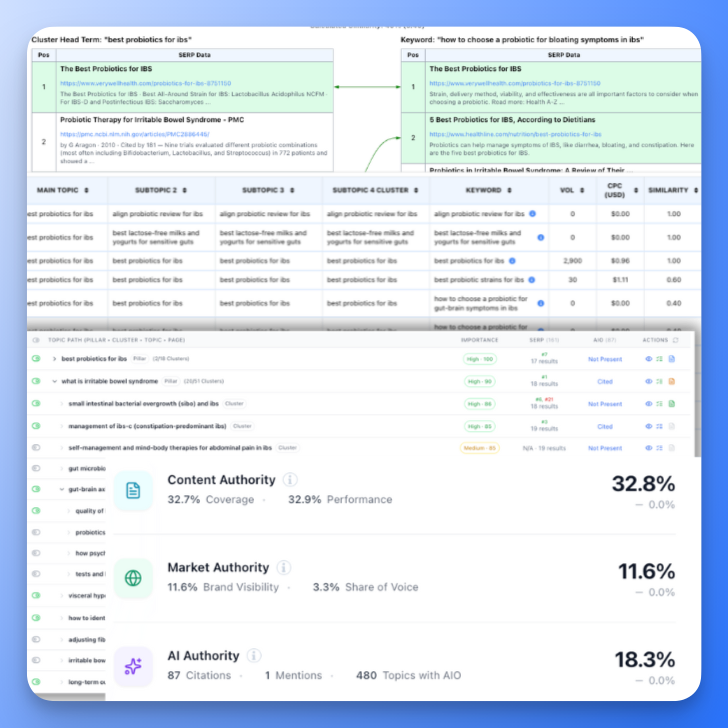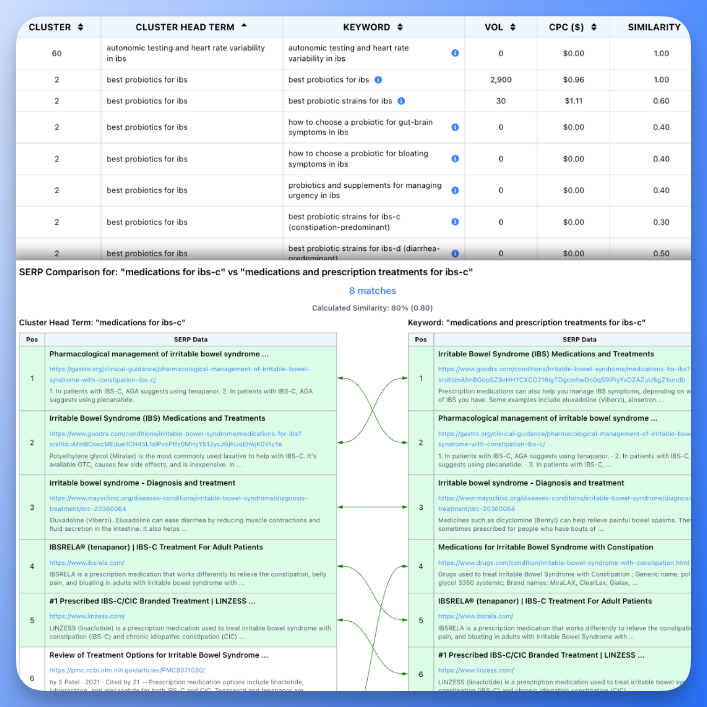SERP-Based Clustering.
Built For Intent, Not Lists.
Group keywords by the URLs they share. See which queries belong on the same page, stop cannibalization, and send clean clusters into your topical map.
Cluster by Real Search Behavior
Semantic tools guess which keywords belong together. Floyi looks at what search engines already rank.
For each keyword list, Floyi pulls result pages, measures URL overlap, and forms clusters that match search intent. You see when two queries should live on one page, when they deserve their own content, and where competitors already own an entire cluster.
Inside SERP Clustering
Everything you need to turn loose keyword lists into intent-based clusters that feed your map and briefs.
SERP Similarity Analysis
Floyi groups keywords by overlapping URLs in the results. If queries share most of the same pages, they share intent and belong in the same cluster.
Intent-Based Groups
Spot informational, commercial, and transactional patterns from the SERPs themselves. Plan the right content type for each cluster instead of guessing from modifiers.
Cannibalization Checks
See where multiple pages are targeting the same cluster of queries. Consolidate, merge, or retarget pages before they dilute rankings and topical authority.
Export to Topical Maps
Send clusters straight into the Topical Map generator and Authority Planner. Build a 4-level architecture with clusters already aligned to search reality.
From Keyword Lists to Structured Authority
Clustering is the link between AI-generated topics and a map that search engines trust.
Topical Research
Start with topics from Topical Research.
SERP Analysis
Pull real SERPs for each keyword list.
Clustering
Group queries into clusters by URL overlap.
Topical Map
Send clusters into Topical Maps and Authority Planner.

SEO Teams Trust SERP Clustering
We thought we needed 120 articles. SERP clustering showed we only needed 40 strong pages and a cleaner internal link structure.
Alex Martinez
SEO Lead, E-commerce
Floyi made cannibalization obvious. We combined overlapping posts into focused cluster pages and watched rankings stabilize.
Nina Patel
Content Director, SaaS
The integration with Topical Maps is the difference. Clusters are not just a CSV export. They flow straight into our content roadmap.
Chris Davies
Senior SEO, Agency
Frequently Asked Questions
What is SERP clustering?
SERP clustering groups keywords by the result pages they share. If several queries show many of the same URLs in their results, they share intent and should usually be handled by one primary page or a tightly linked set of pages.
How is this different from semantic clustering tools?
Semantic tools group keywords by language similarity. Floyi groups them by what search engines actually rank. SERP clustering reflects real behavior, highlights intent shifts, and catches situations where similar words deserve different pages.
How many keywords can I cluster at once?
Floyi handles lists from a few hundred to several thousand keywords in one run. Larger lists take longer to process but follow the same workflow. Many teams start with 500 to 2,000 keywords per project, then refine clusters as strategy evolves.
What do I do with the clusters?
Use each cluster to define a primary page, supporting content, and internal links. Export clusters into Topical Maps, create briefs for each key cluster, and align existing content so every important query has a clear home.
Does SERP Clustering connect with the rest of Floyi?
Yes. Clusters sit at the center of Floyi’s system. They connect Topical Research to Topical Maps, briefs, and the Authority Planner, so every decision you make is grounded in real SERPs instead of keyword dumps.
Stop guessing. Start clustering by intent.
Get 500 free credits to cluster your first keyword list.

